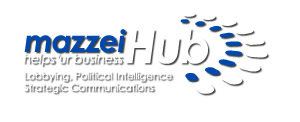Correctly influencing the rules of the game

Competitiveness is the key word for those who want to play with their heads held high in an ever more global and selective market.
It is not enough to be talented and efficient in your own sector.
If the rules of the game impede you from working the way you could, and favour your competitors, you are condemned to suffer and succumb.
Who writes the rules of the game? Many people, who make up the “public power”. We call them public deciders.
Where are they? In Brussels in the Parliament and the European Commission, in Rome in the national parliament and the central government, in the autonomous regions and provinces and in the districts, in all the central and peripheral articulations of the Public Administration, in the independent authorities which regulate the various markets , such as the Bank of Italy, Consob (the public authority responsible for regulating the Italian securities market), Antitrust (the Competition Authority) Privacy, Avcp (Authority for the Supervision of Public Contracts for works, services and supplies), Ivass (the Insurance Companies Supervisory Institute), Agcom (the Comminications Regulatory Authority), Aeeg (The Regulatory Authority for Electricity and Gas), the Transportation Authority, Covip (the vigilance committee on individual retirement accounts), Agia (Ombudsman for Children and Teenagers), Cgs (Authority for the Supervision of strikes), Civit (the independent Commission for Evaluation, Transparency and Integrity of Public Administrations National Anti-Corruption Authority )
What do they do? Produce European regulations and directives, national and regional laws, legislative decrees, ministerial regulations, independent authority regulations, ordinances, memoranda and so on. A complex web which sets the goalposts for your business.
Following and influencing all this production of rules is essential for the life of a company, an association, or anyone who wants to protect his or her own legitimate interests. For this reason it is important to lobby, develop institutional relationships, and have a network of government relationships in order to influence public policy.
Don’t wait for the rules to be written and then complain that they’ve created problems.
Intervene beforehand to protect your interests and give your contribution, so that the rules are good for you and your country. It’s your right, and also your responsibility.
If you’re not doing it, just know that your competitors are.
The services that MazzeiHub offer for lobbying, institutional relations, government relations and public policy are:
- Monitoring of the current legislation related to the client’s interests during the conception, planning, processing and implementation phases;
- Monitoring of the political climate concerning the client’s interests;
- Mapping of the influent and efficient deciders that interest the client, identifying those who, at various levels, are at the helm;
- Analysis of the key issues that the client is willing to achieve and of the problems related to the interest that the company is willing to protect or promote;
- Processing of the lobbying strategy in order to influence the public deciders in the respect of transparency and fairness, aiming at the result sought from the client;
- Drafting of legislative texts and of acts to be used during the decisional processes to promote decisions advantageous for the client;
- Editing of position papers that will summarize the position that the client is willing to promote;
- Editing of dossier in support of the client’s interest;
- Coalition building with other interests and subjects that can be involved in order to support the client’s objectives;
- Organization of authoritative and incisive meetings with public deciders and subjects able to influence the decisions in order to inform them on the client’s interests;
- Planning and realization of information campaigns and advocacy advertising on subjects related to the client’s interest;
- Implementation of the lobbying strategy through direct lobbying on the influent deciders and indirect lobbying through the mobilization (grass root lobbying) of a wide audience that might indirectly sustain the campaign in order to achieve the client’s objectives;
- Qualitative and quantitative public opinion polls and surveys for getting useful information to sustain the client’s interest, before and after the lobbying activity;
- Drafting of periodic reports for updating the client on the different stages of the lobbying strategy;





 Lobbying, institutional relationships, government relations and public policy
Lobbying, institutional relationships, government relations and public policy